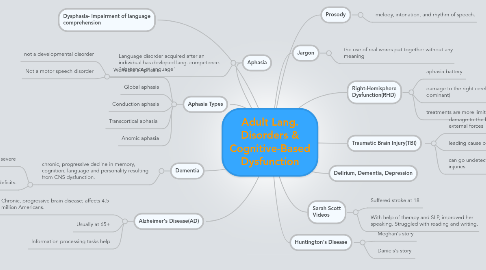Adult Lang. Disorders & Cognitive-Based Dysfunction
by Bethany Daniels

1. Aphasia Types
1.1. Wernicke's Aphasia
1.2. Global aphasia
1.3. Conduction aphasia
1.4. Transcortical aphasia
1.5. Anomic aphasia
2. Aphasia
2.1. Language disorder acquired after an individual has devloped lang. competence. "abscence of language"
2.1.1. not a developmental disorder
2.1.2. Not a motor speech disorder
3. Dementia
3.1. chronic, progressive decline in memory, cognition, language and personality resulting from CNS dysfunction.
3.1.1. mild, moderate, severe
3.1.2. Treated with some perscriptions and speech-language therapy helps with deficits.
4. Alzheimer's Disease(AD)
4.1. Chronic, progressive brain disease; affects 4.5 million Americans.
4.2. Usually at 65+
4.3. Information processing tasks help
5. Dysphasia- impairment of language comprehension
6. Jargon
6.1. the use of real words put together without any meaning
7. Right-Hemisphere Dysfunction(RHD)
7.1. aphasia battery
7.2. damage to the right cerebral hemisphere(non dominant)
7.3. treatments are more limited
8. Traumatic Brain Injury(TBI)
8.1. damage to the brain from the impact of external forces
8.2. leading cause of death and disability in U.S.
8.3. can go undetected- open and closed-head injuries
9. Prosody
9.1. melody, intonation, and rhythm of speech.
10. Delirium, Dementia, Depression
11. Sarah Scott Videos
11.1. Suffered stroke at 18
11.2. With help of therapy and SLP, improved her speaking. Struggled with reading and writing.
12. Huntington's Disease
12.1. Meghan's story
12.2. Daniels's story


